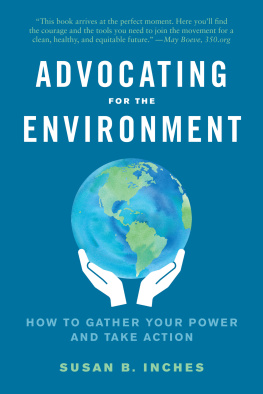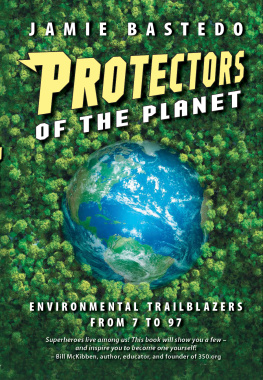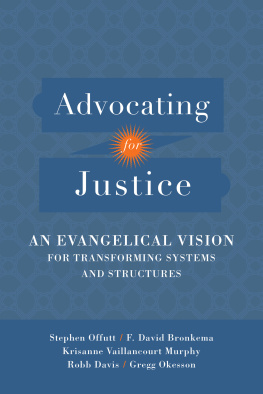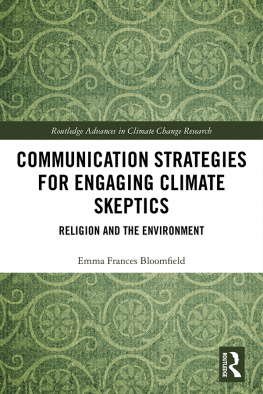
Praise for Advocating for the Environment
This book arrives at the perfect moment. Many of us, especially those most affected by climate change, feel powerless against big corporations and the government. This inspiring and practical text by Sue Inches shows how ordinary citizens do have the power to change the world. In Advocating for the Environment, youll find the courage and the tools you need to join the movement for a clean, healthy, and equitable future.
May Boeve, cofounder and executive director at 350.org
Sue Inches is a deep thinker of the best sort. With a wealth of experience in policy, education, and advocacy, she gives terrific advice for all who seek to give voice to nature and inspire both individual and collective action.
Seth Berry, chair of the Energy, Utilities, and Technology Committee, House of Representatives, Maine Legislature
This book expands an environmental policy class from theory to action. Drawn from a wealth of practical experience, Sue Inchess insights and advice, from framing a vision to writing a letter to your senator, are credible and valuable to my students. The wisdom in this book is just what student and community advocates need to meet our current environmental challenges.
Dr. Richard Peterson, professor of environmental studies, University of New England
This is that rare book that speaks not only to environment students but to all people who care about their future. At once both holistic and practical, nuanced and vivid, Advocating for the Environment gives us the guidance we need to take action for a vibrant and healthy future.
George Lakey, professor, activist, and author of How We Win
Sue Inches turns what could have been a straightforward how-to book into something much more. She crafts a riveting narrative drawing on her personal experiences, tantalizing us with tricks of the trade garnered through a broad and successful career in both the public and private sectors. The reader will finish with a clear understanding of why advocacy matters.
Marianne Hill, senior economist emerita, Mississippi Research Center
Demanding change is not enough! We need more effective campaigns, and more organizers, storytellers, and advocates to persuade those with power to do the right thing. Sue Inches breaks down the change process step by step in her book. If youre concerned about the environment and want justice for all, this book will help you craft a winning approach and engage others in making the world a better place.
Michael Belliveau, founder and executive director, Defend Our Health
Sue Inches makes a strong case for grounding advocacy in ones personal experience and describes the importance of understanding the variety of scientific and human factors that will persuade decision makers to act to protect the planet. Her book is a valuable resource for anyone who seeks to influence public policy.
Everett Carson, chair emeritus of the Environment and Natural Resources Committee, Senate, Maine Legislature
Sue Inches has an amazing way of bringing people along the learning curve of effective advocacy. Whether you are a newcomer to environmental advocacy or a longtime advocate like me, there are powerful lessons to be learned from her.
Maya K. van Rossum, founder of the Green Amendment for the Generations movement, author of The Green Amendment, and leader of the Delaware Riverkeeper Network
Copyright 2021 by Susan B. Inches. All rights reserved. No portion of this book, except for brief review, may be reproduced, stored in a retrieval system, or transmitted in any form or by any meanselectronic, mechanical, photocopying, recording, or otherwisewithout the written permission of the publisher. For information contact North Atlantic Books.
Published by
North Atlantic Books
Berkeley, California
Cover art gettyimages.com/keiko takamatsu
Cover design by Rob Johnson
Book design by Happenstance Type-O-Rama
Advocating for the Environment:How to Gather Your Power and Take Action is sponsored and published by North Atlantic Books, an educational nonprofit based in Berkeley, California, that collaborates with partners to develop cross-cultural perspectives, nurture holistic views of art, science, the humanities, and healing, and seed personal and global transformation by publishing work on the relationship of body, spirit, and nature.
North Atlantic Books publications are distributed to the US trade and internationally by Penguin Random House Publishers Services. For further information, visit our website at www.northatlanticbooks.com.
Library of Congress Cataloging-in-Publication Data
Names: Inches, Susan B., 1954 author.
Title: Advocating for the environment : how to gather your power and take
action / Susan B. Inches.
Description: First. | Berkeley : North Atlantic Books, 2021. | Includes
bibliographical references and index.
Identifiers: LCCN 2020052584 (print) | LCCN 2020052585 (ebook) | ISBN
9781623176174 (trade paperback) | ISBN 9781623176181 (ebook)
Subjects: LCSH: Environmental degradationPrevention. | Environmental
protectionPolitical aspects.
Classification: LCC GE140 .I53 2021 (print) | LCC GE140 (ebook) | DDC
363.7/052dc23
LC record available at https://lccn.loc.gov/2020052584
LC ebook record available at https://lccn.loc.gov/2020052585
This book includes recycled material and material from well-managed forests. North Atlantic Books is committed to the protection of our environment. We print on recycled paper whenever possible and partner with printers who strive to use environmentally responsible practices.
Authors Note
Every effort has been made to refer to ethnicity, race, and gender in an inclusive and fair way in this book. We have chosen to capitalize the word White when referring to race, in order to avoid framing Whiteness as the standard, and to recognize how Whiteness functions in our institutions and communities. My publisher, North Atlantic Books, also chooses to capitalize the terms Black and Indigenous, as these are used as proper names and not just as adjectives. They are used as ethnicity or nationality markers, signifying identity and importance. Capitalizing the word Black conveys a shared history, identity, and community among people who identify as Black or have African heritage. Capitalizing the word Indigenous references the original inhabitants of a place along with their history and culture.
Introduction
Imagine how the world would look and feel if we made a healthy, joyous, safe, and equitable planet a reality. Now imagine that it would only take 3.5% of us to bring this about. Research has shown that this can happen. But in order for it to happen, we have to imagine it, we have to feel it, we have to believe it, and we have to take action. That is what this book is about.
Humanity is expanding its understanding of who we are and where we fit with the rest of life on the planet. Im writing this as were experiencing the COVID-19 pandemic, a renewed movement to lift up Black lives, a serious economic downturn, and a dangerously warming atmosphere. These events are awakening us to the idea that no ones life, race, gender, country, or occupation is more important than anothers, and the earth itself matters. A major shift in consciousness has begun.
Scientific studies show how forests are a single living system with many connected parts. The ocean is also a living system, interacting with the atmosphere and the water cycle to create the weather. We are learning that our bodies are a living system too, composed of microorganisms and human cells that continuously interact. Estimates of the ratio of nonhuman to human cells in our bodies range from 1:1 to 10:1.
Next page









